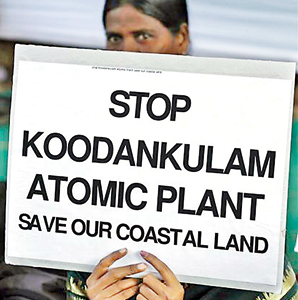Sunday Times 2
An atom of doubt at the Kudankulam nuclear power plant
View(s):(Reuters) Opponents of the Kudankulam Nuclear Power Plant, under construction in Tamil Nadu, are raising fresh questions about the plant’s safety because of Indian government documents that they say reveal a problem in the design of one of the two reactors.The reactor’s design differs from the plan that Russia and India came up with when they agreed to build the reactor in 1988, according to the documents published by India’s Atomic Energy Regulatory Board.

Kudankulam Nuclear Power Plant protests in Tamil Nadu (REUTERS)
The design of the reactor pressure vessel, which contains the reactor coolant and core, was not supposed to have welds in its core region, the bulletin said. The vessel has two welds there, it said.
People who live near the Kudankulam plant and the People’s Movement Against Nuclear Energy called this deviation a “serious breach of contract” that exposes the plant to high failure risk and a higher possibility of offsite radiological contamination. “This is a breach of contract by the supplier in Russia. NPCIL (Nuclear Power Corporation of India) officers who knew [about] this breach are guilty of causing future financial loss by choosing lower quality equipment,” said Nityanand Jayaraman, environmental researcher and member of the Chennai Solidarity Group for Kudankulam Struggle.
RS Sundar, the plant’s site director, denied that it was a “breach of contract”. “The original discussion between Indian and Russian governments on procuring reactor vessels without welds was based on futuristic thinking,” he told me. “But that was not possible technologically at the time of procurement.”
Addressing safety, Sundar said, “all the 400-plus light water reactors in operation across the globe [have] welds in the core zone.”India’s nuclear program in its early years was an epitome of national pride as most of the technology was domestically developed, with India not being a member of the Nuclear Non-Proliferation Treaty. But with the lifting of a ban by the Nuclear Suppliers Group and after theFukushima disaster in Japan, the feeling of pride has been replaced by safety concerns among the general public, especially those living around the project areas. There are 20 nuclear power plants in India spread across six states producing a total of 4780 megawatts of electricity. Three new projects including Kudankulam are near completion.
The controversy over the reactor welds is one of many problems that have kept the anti-nuclear protests alive in Kudankulam. Another is over the source of fresh water for the plant’s cooling towers. The Environmental Impact Assessment conducted in 2003 assumes that the Pechiparai Reservoir will be the source of fresh water, with a reserve of 60,000 cubic metres. Farmers have protested the use of reservoir water, however, and now there are four plants for desalinating ocean water. The environmental impact of using this water has not been assessed.The on-campus water reserve was also reduced to 12,000 cubic metres, 20 percent of what was proposed. Environmentalists say that this is a “serious breach of safety” by the government’s nuclear authorities, especially after the Fukushima nuclear accident in Japan.
While the limited information available to the public has mobilised some people against the project, the nuclear power corporation authorities are keeping other reports private. The Safety Analysis Report is one of the key documents that protesters have demanded that theNPCIL release. Despite efforts to get that information, the nuclear power corporation has been reluctant to share it claiming it was a third party document. Russian atomic supplier, Atomstroyexport, is not bound by the civil nuclear liability law because the law, which holds the operator liable for nuclear damages, was drafted after the 1988 agreement to design the plant.
This reticence has turned people who have a neutral or even positive opinion on nuclear power against the project. What might people think about nuclear power in India if the government chose to be more forthcoming about its facilities? Surely, it would be a more positive view than it seems to be now.






















